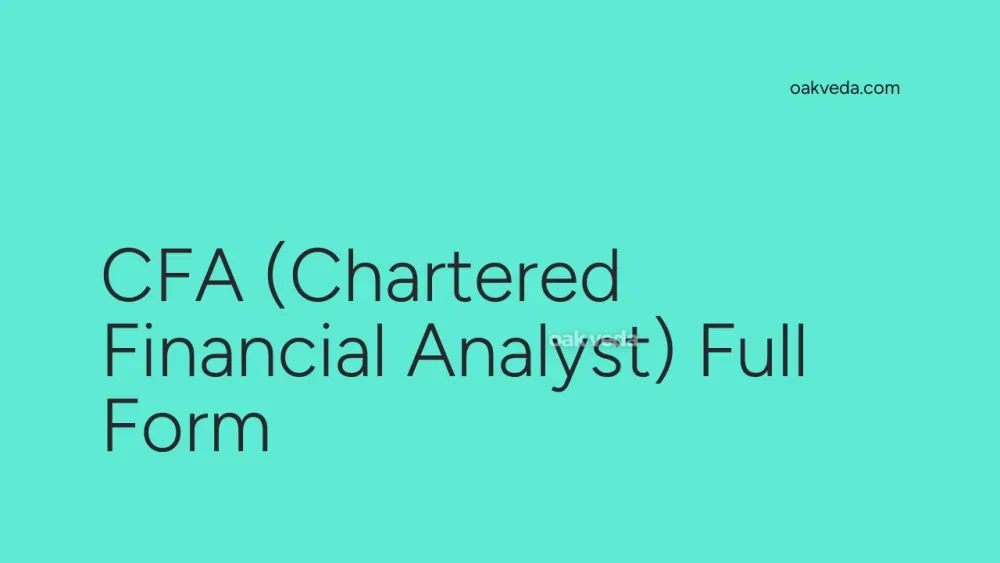
What is the Full Form of CFA?
The full form of CFA is Chartered Financial Analyst. This prestigious designation is awarded by the CFA Institute, a global association of investment professionals. The CFA certification is widely recognized as the gold standard in the financial industry, particularly in the fields of investment analysis and portfolio management.
What is Chartered Financial Analyst?
A Chartered Financial Analyst is a highly skilled finance professional who has demonstrated expertise in investment analysis, portfolio management, and ethical decision-making. CFA charterholders are known for their in-depth knowledge of financial markets, valuation techniques, and risk management strategies.
Origin and Development of Chartered Financial Analyst
The CFA program was established in 1962 by the Institute of Chartered Financial Analysts, which later became part of the CFA Institute. The program was created to set a global standard for investment professionals and to promote ethical practices in the financial industry. Over the years, the CFA designation has gained international recognition and is now sought after by finance professionals worldwide.
How does the CFA Program work?
The CFA program consists of three levels of examinations, each building upon the knowledge gained in the previous level. Candidates must pass all three levels sequentially and meet other requirements to earn the CFA charter. The curriculum covers a wide range of topics, including:
- Ethical and Professional Standards
- Quantitative Methods
- Economics
- Financial Reporting and Analysis
- Corporate Finance
- Equity Investments
- Fixed Income
- Derivatives
- Alternative Investments
- Portfolio Management and Wealth Planning
Functions of Chartered Financial Analysts
CFA charterholders play crucial roles in various aspects of the financial industry. Their primary functions include:
- Investment Analysis: Evaluating securities and market trends to make informed investment decisions.
- Portfolio Management: Constructing and managing investment portfolios for individuals and institutions.
- Risk Management: Assessing and mitigating financial risks for organizations.
- Financial Advisory: Providing expert advice on investment strategies and financial planning.
- Research: Conducting in-depth financial research and producing reports for clients or employers.
Applications of CFA Certification
The CFA designation is highly valued across various sectors of the financial industry. Some key areas where CFA charterholders apply their expertise include:
- Asset Management
- Investment Banking
- Private Equity and Venture Capital
- Corporate Finance
- Risk Management
- Financial Consulting
- Wealth Management
- Hedge Funds
Features of the CFA Program
The CFA program is known for several distinctive features:
- Global Recognition: The CFA charter is respected worldwide, opening doors to international career opportunities.
- Comprehensive Curriculum: The program covers a broad range of financial topics, ensuring a well-rounded knowledge base.
- Ethical Focus: A strong emphasis on ethical practices and professional standards is integral to the CFA program.
- Self-Study Format: The program allows candidates to study at their own pace while working full-time.
- Rigorous Testing: The three-level examination process ensures that only the most dedicated and knowledgeable candidates earn the charter.
Benefits of Becoming a CFA Charterholder
Earning the CFA designation offers numerous advantages:
- Career Advancement: The CFA charter can lead to better job opportunities and faster career progression.
- Higher Earning Potential: CFA charterholders often command higher salaries compared to their non-chartered counterparts.
- Professional Network: Access to a global network of finance professionals through the CFA Institute.
- Credibility: The designation lends credibility and demonstrates a commitment to excellence in the finance industry.
- Continuous Learning: CFA charterholders have access to ongoing educational resources and industry insights.
Limitations or Challenges of the CFA Program
While the CFA program offers many benefits, it also presents some challenges:
- Time Commitment: The program requires a significant investment of time, often taking 3-4 years to complete all three levels.
- Rigorous Curriculum: The study material is extensive and demanding, requiring dedication and discipline.
- Low Pass Rates: The exams are known for their difficulty, with pass rates often below 50% for each level.
- Work Experience Requirement: Candidates must accumulate 4,000 hours of relevant work experience to earn the charter.
- Cost: The program fees, study materials, and potential retakes can be a significant financial investment.
Future Developments in CFA Technology
The CFA Institute continually updates its curriculum to reflect changes in the financial industry. Some areas of focus for future development include:
- Fintech and Blockchain: Incorporating more content on emerging technologies affecting the finance sector.
- ESG Investing: Expanding coverage of environmental, social, and governance factors in investment analysis.
- Data Analytics: Increasing emphasis on data science and its applications in finance.
- Artificial Intelligence: Exploring the impact of AI on investment strategies and financial decision-making.
- Remote Testing: Continuing to improve and expand computer-based testing options for candidates worldwide.
FAQs on CFA Full Form
-
What are the eligibility criteria for the CFA program? Candidates must have a bachelor's degree or be in the final year of their degree program. Alternatively, they can have four years of professional work experience or a combination of work and college experience totaling four years.
-
How long does it take to complete the CFA program? On average, it takes candidates 3-4 years to complete all three levels of the CFA program.
-
What is the exam format for CFA exams? The Level I exam consists of multiple-choice questions, while Levels II and III include item sets and essay questions.
-
How often are CFA exams conducted? The Level I exam is offered four times a year, while Levels II and III are offered twice a year.
-
Is work experience required to earn the CFA charter? Yes, candidates must complete 4,000 hours of relevant work experience, which can be accrued before, during, or after passing the exams.
In conclusion, the CFA (Chartered Financial Analyst) designation represents a pinnacle of achievement in the finance industry. While challenging to obtain, the benefits of earning this prestigious certification can significantly enhance one's career prospects and professional credibility in the global financial markets.
You may be interested in:

